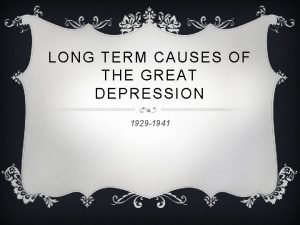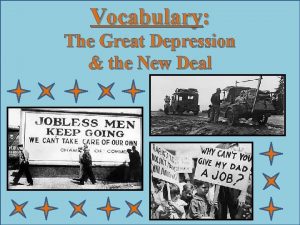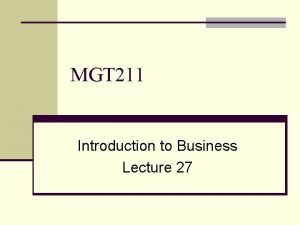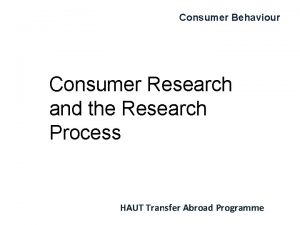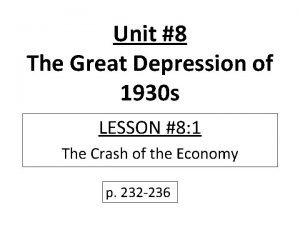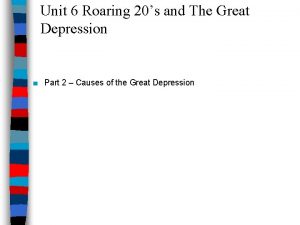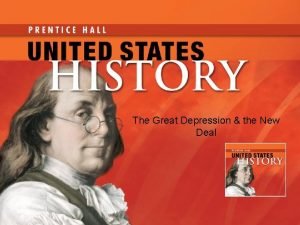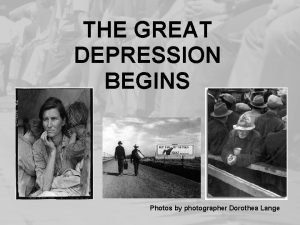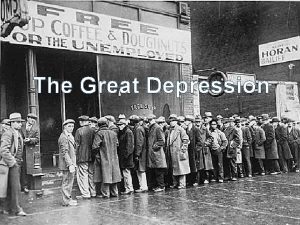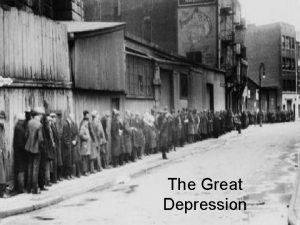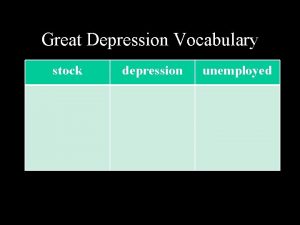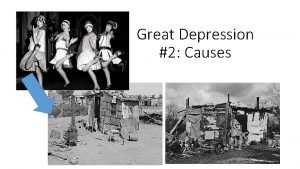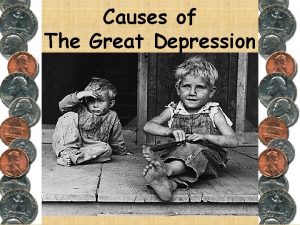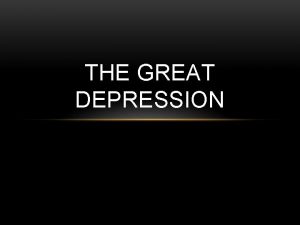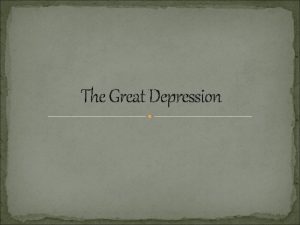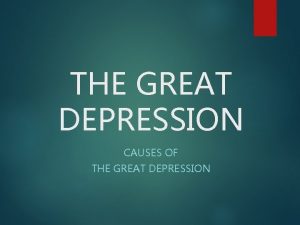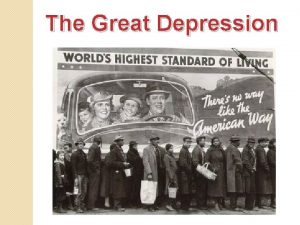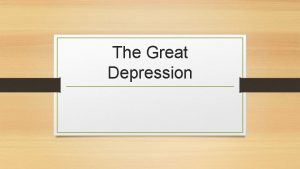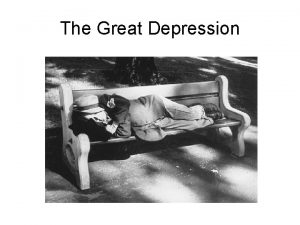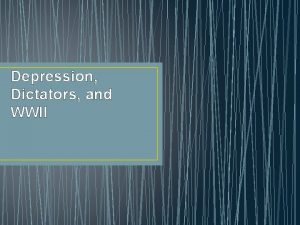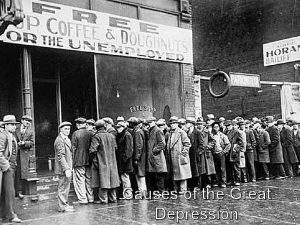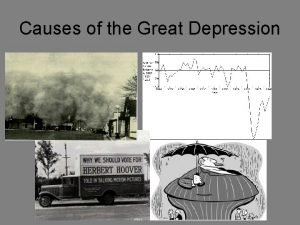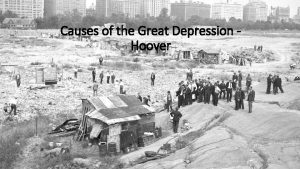Causes of The Great Depression Consumer Goods After

























- Slides: 25

Causes of The Great Depression

Consumer Goods • After war what happens to factories? • With decrease in taxes after increase WWI people had more disposable income & business look to profit: (why were taxes down? ) • New goods came on the market • (Ford’s idea of assembly line is mass producing all consumer goods) Washing machines, refrigerators, toasters, vacuums, air conditioners • Companies created new products for the home & started mass production of everything.

• advertisements: small goods: razors, tissues, frozen foods, home hair color, band aids, deodorant. (Advertisers convinced you that you needed them to survive) • With more homes wired w/ electricity new consumer goods invented: Large goods: Refrigerators, vacuums, washing machines, radio, dishwasher, air conditioners, toaster (durable goods) • What's wrong with economy based on durable goods? (its why economy booming) • (what other time saw this kind of boom? ) • Internet – dot com era

Easy Consumer Credit • One reason for economic boom 1920’s was use of individual borrowing or credit. • Prior to 1920’s debt/credit was shameful • Now attitudes change because people believe they can pay it back • how is gap between rich & poor contributing to this? )(what should been done? ) • Raise wages! • “Buy now & pay later” became the advertising pitch & Americans racked up credit, buying all the new gadgets for their homes (convinced they couldn’t live w/ out these goods)(advertising works) • by 1929 $6 billion worth of goods were bought on credit but 80% Americans have no savings at all. • Today=$931 b - 34% have no savings

Mass Advertising • New gadgets/inventions needed to be sold to the American people • Advertisers convinced public their need for these goods (ex. Deodorant – “your friends are too afraid to tell you”) • Ex. Easy credit plans, • envy of peers, l • inking product w/ famous people (testimonials) • Advertisers had communication access w/ people through radio

Stock Market Soars • Stock market experiences long period of rising prices (bull market) • 1920’s prolonged bull market convinced people to invest in stocks • Investors began buying stocks on margin (credit)= w/ $1000 investor could buy $10, 000 worth of stock & the other $9, 000 loaned by bank • bank earned commission on sale & interest on loan –profit motive! • no rules on how much banks have to hold in reserve so loaned most of it out & Held stock as collateral

• All is good as long as stocks cont. to rise: if $10, 000 stock rose to $11, 000 investor could sell stock repay the loan & make $1, 000 in profit. • Stocks rose 50 times higher then worth of share because of the demand for the stock not the worth of company (Bubble) (housing bubble of 2008)

How stocks work • Stock is piece of company & price is value of % of company –limited liability of corporation. • ex. $1 m co. w/ 1 m shares =$1. 00 each – if co. worth goes up to $2 m then each share worth $2 (profit $1 per share) • If company was making profits or had good future sales =stock price rise (& everything is ok) • Stock prices fell when companies earnings dropped (because warehouses started to fill up because lack of new customers for durable goods) • Speculation= buyers bet the market would cont. to climb & they would make money quick (buying stocks above worth of company to get quick return/profit)

Company • • • 1929 bubble price Edison’s Electric-GE $440 American Power $1, 753 Brooklyn Gas $2, 481 Consolidated Gas $1831 Trans. America $673 • American Superpower $711 Actual Worth $164 $641 $99 $801 $201 almost 3 X 2. 5 X 24 X 2 X 3 X $15 47 X • *why was their a Increase of prices of stock above the actual worth of the company? • Demand for good or demand for stock? ? ? • Worth of company or worth of stock?

What comes • Bull market lasted only as long as up must come investors continue to put new down money into market • Plus economy based on durable goods so once you have refrigerator don’t need one for decade • By 1929 , market running out of new customers. How did Imperialist deal with this? • New customers could have been Europeans (their economy destroyed) but reciprocal tariff shut us out why? (Haley-Smott Tariff raised again) • What Wilson 14 pt could have fixed this? • No trade barriers (no tariffs) • New customers could have been farmers but electric grid didn’t reach rural areas

• By Sept. 1929 professional investors see no new customers & start to sell off their holdings. • Joseph Kennedy made $ off prohibition, then pulled $ out stock market when his shoe shiners playing same stock market he had his millions in!!! • Prices slipped / other investors followed / prices fell further -dominos

Stock Market Crash • Oct. 21, 1929 stock market plunged. • Oct. 24 th stock market plummeted further • Oct. 29 th Black Tuesday prices took steepest dive yet (33% drop) • Stock market lost $10 -15 billion in value. • $30 billion was lost. • ($30 billion) That equaled total wages earned in 1929

Banks Begin to Close • By 1929 banks had loaned $6 billion to stock speculators • Banks had put customer’s investments in stock market (hoping for higher returns) then if they loaned $ to customers (no regulations against this) • So when stocks collapsed banks lost $ on investments & lost $ from speculators who defaulted on loans. (stockbrokers dumped worthless stocks on banks)

• Banks hid this fact & cooked the books for weeks until leaked out. • News of banking crisis sent customers running to get their $ = bank runs (banks only carry % of $ you give them)(so no $) (no reserve requirement yet!)(today 3 -10%) • Banks begin to close w/ customers losing all their savings (today we have FDIC up to $250, 000) • Show “Bust” America the Story of Us: 1: 00 -6: 15 (tues didn’t finish)

Herbert Hoover is President 1928 -32 FDR becomes President in March

• Stock market crash was a trigger to other deep seeded issues that caused Great Depression:

Roots of the • 1. Uneven Distribution of Income = Great Factories produced more then Depression consumers could consume. Needed (Causes) new customers? How did Ford fix this? • Pay workers more! • How did we fix this during imperialism? • Gobble up new territory=customers • So how did they fix this in the 1920 s? • So came up w/ installment plan but w/ monthly payments increasing buyers ($6 b)(80% no savings) Today=$931 b - 34% have no savings – what has Govt done to increase this under Trump?

• 2. stopped buying new goods why? • because durable • Decrease in sales caused businesses to cut production clue: warehouses fill up • & as a result start to lay off employees (remember 80% of America has no savings)(no Unemployment or SS)

• 3. Chain reaction: cut in radio sales caused decline in copper wire sales (copper miners lost jobs) wood cabinets (lumberjacks lost jobs) & glass radio tubes (glassmakers lost their jobs) domino effect

• 4. 26, 000 businesses collapsed • reasons= • 1. lack sales • 2. $ in banks lost in stock market.

5. Loss of Export • Many jobs might have been saved if Americans manufacturers sold more Sales goods overseas (Recovering Europe desperate for these goods) why didn’t they? ? • Conservative Republicans had raised the tariff in the 1920’s to protect American businesses AGAIN–Hawly-Smoot Tariff (highest ever) tariffs cause what? • WHATS WRONG WITH THIS & 16 TH AMEND? • (didn’t grasp reciprocal tariffs yet) Foreign countries responded by raising their own tariffs (EACH SHUT OF OTHER MARKETS) • This meant fewer American goods sold overseas (demand down)(SUPPLY UP) • Ability to produce goods outran its capacity to consume (supply over demand) (gap between rich & poor caught up with us)

6. Federal Reserve Failure Jerone Powell • Failure to prevent widespread collapse of the nation’s banking system • FED Actions =control $ supply • After Stock Market : Should have lowered interest rates to encourage new businesses but raised % to stop excessive borrowing (speculation) • Lead to a severe contraction in the nation’s supply of money in circulation. • Less $ in circulation means prices up during recession

Depression worsens • $40 B. lost in Stock Market (total cost of WWI for U. S. ) • never got loans from GB & France WWI becaue guilt clause made German economy plummet. • By 1930 4 m. jobless & 2 yrs later # tripled 12 m ( 1 in 4 out of work 25%) • People w/ out jobs went hungry (bread lines blocks long to get free food) YMCA & Salvation Army

• Families couldn’t pay rent or mortgage so homeless #s soar (evictions w/ belongings put on street) (quarter million homeless) • Cardboard homes in cities= Hoovervilles • Sick joke: Hotels clerks asked customers “for sleeping or jumping” • Unemployed began to wander country in search of work (Hobos)(jumping trains) • Hoover flags, “bad time hoovering over us”

 Convenience goods shopping goods specialty goods
Convenience goods shopping goods specialty goods What is the difference between food web and food chain
What is the difference between food web and food chain Great depression causes
Great depression causes What were the long term causes of the great depression
What were the long term causes of the great depression After me after me after me
After me after me after me If any man come after me
If any man come after me Progressive tax examples
Progressive tax examples Positive consumption externality
Positive consumption externality Publik goods
Publik goods Aaa new deal
Aaa new deal Anxiety in the heart of man causes depression
Anxiety in the heart of man causes depression Consumer goods examples
Consumer goods examples Luyana211
Luyana211 Fast moving consumer goods
Fast moving consumer goods Greenfly carnivore
Greenfly carnivore Cengage
Cengage Consumer research process
Consumer research process Chapter 5 consumer markets and buyer behavior
Chapter 5 consumer markets and buyer behavior Changes in an individual's behavior arising from experience
Changes in an individual's behavior arising from experience Rarig great depression
Rarig great depression Great depression
Great depression The ingenious quarterback political cartoon
The ingenious quarterback political cartoon Foreclosure great depression
Foreclosure great depression Five effects of the great depression
Five effects of the great depression Five effects of the great depression
Five effects of the great depression How did the great depression impact the world
How did the great depression impact the world



